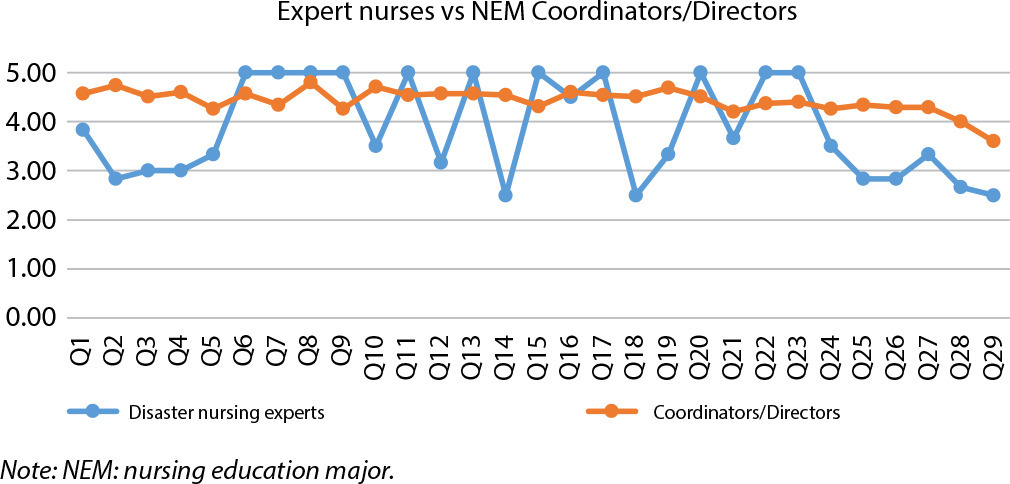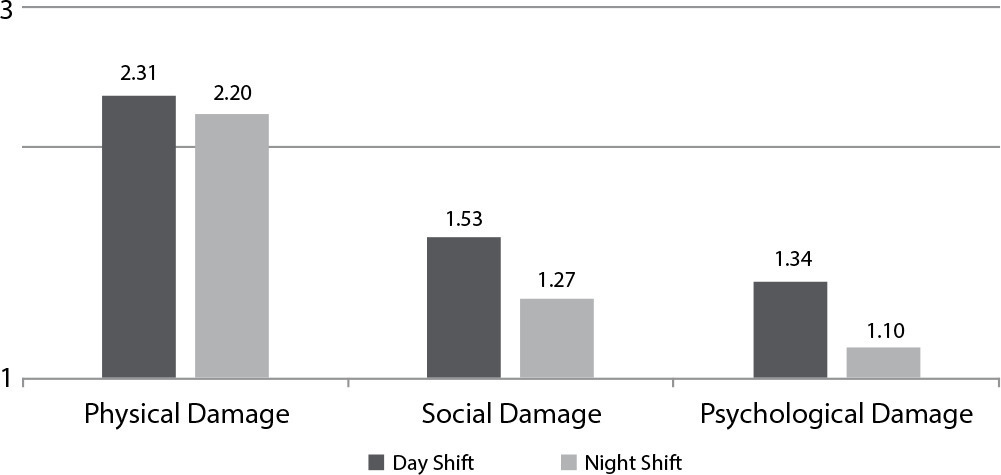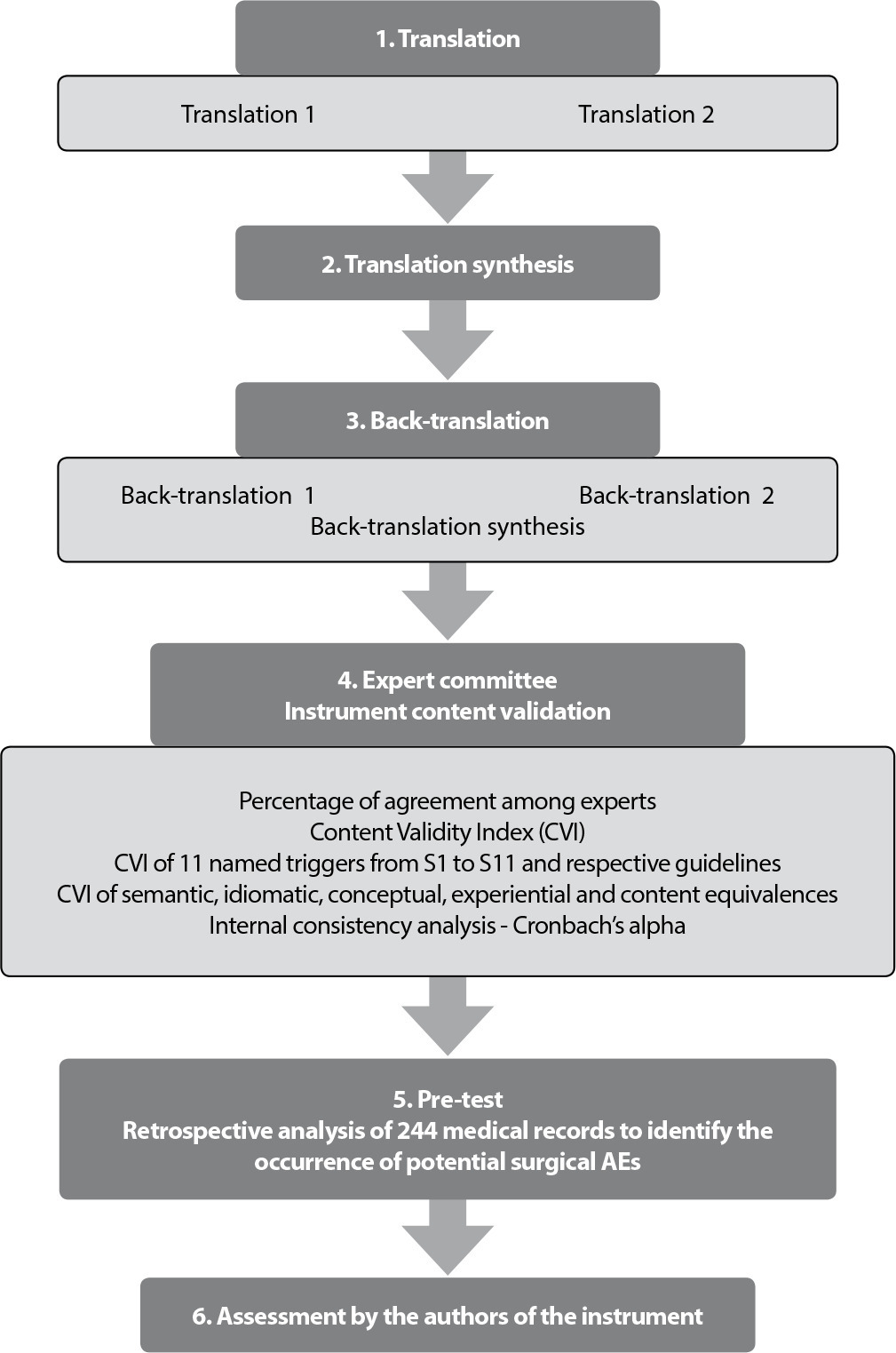-
ORIGINAL ARTICLE07-18-2022
Effectiveness of implementing an improvement cycle in the identification of critically ill patients
Revista Brasileira de Enfermagem. 2022;75(6):e20210346
Abstract
ORIGINAL ARTICLEEffectiveness of implementing an improvement cycle in the identification of critically ill patients
Revista Brasileira de Enfermagem. 2022;75(6):e20210346
DOI 10.1590/0034-7167-2021-0346
Views0See moreABSTRACT
Objective:
To evaluate the effectiveness of implementing a quality improvement cycle in the process for identifying critically ill patients in an intensive care center.
Methods:
The implementation of an observational and interventional improvement cycle, using a before-and-after quasi-experimental design, with a quantitative approach, in an intensive care center. Seven criteria were developed to evaluate the quality of the identification process. The results of the intervention were subjected to statistical analysis.
Results:
The quality of the identification process showed significant improvement in the values referring to compliance with the conformities in the criteria evaluated. Statistical significance was observed in the evaluations of criteria C1, C2, C3, C4, and C6, with increased compliance values after the intervention.
Final considerations:
The efficacy of the improvement cycle in the quality of the patient identification process was evidenced. It was possible to involve and encourage the participation of the care team and improve organizational processes.

-
ORIGINAL ARTICLE07-18-2022
Beliefs, knowledge, actions of nursing techniques in breastfeeding in pain management in immunization
Revista Brasileira de Enfermagem. 2022;75(6):e20210546
Abstract
ORIGINAL ARTICLEBeliefs, knowledge, actions of nursing techniques in breastfeeding in pain management in immunization
Revista Brasileira de Enfermagem. 2022;75(6):e20210546
DOI 10.1590/0034-7167-2021-0546
Views1See moreABSTRACT
Objective:
Understand the beliefs, knowledge, and actions of nursing technicians on breastfeeding as a form of non-pharmacological intervention to relieve pain in newborns and infants during immunization.
Methods:
Qualitative study carried out through semi-structured interviews with nine nursing technicians from three Basic Health Units in a city in the state of São Paulo. The theoretical approach of the Belief Model and the methodological framework of Thematic Analysis supported this study.
Results:
Three themes originated: Beliefs, Knowledge, and Actions of nursing technicians.
Final considerations:
Despite knowledge about the benefits of breastfeeding as the most effective method for relieving pain in newborns and infants during vaccination, their restrictive beliefs overrode the evidence, leading them to act in ways that discourage or prevent the mother from breastfeed during vaccination. Formal training is recommended to align with current evidence-based practices.
-
ORIGINAL ARTICLE07-18-2022
Profile of transversal skills of Nursing students to intervene in disaster situations
Revista Brasileira de Enfermagem. 2022;75(6):e20210760
Abstract
ORIGINAL ARTICLEProfile of transversal skills of Nursing students to intervene in disaster situations
Revista Brasileira de Enfermagem. 2022;75(6):e20210760
DOI 10.1590/0034-7167-2021-0760
Views0See moreABSTRACT
Objective:
to identify the profile of transversal teaching/learning skills, which allows an adequate intervention of disaster nursing students.
Methods:
this is research framed in the qualitative, transversal paradigm methodology, supported by inductive and exploratory reasoning.
Results:
it was found that there is no consensus between Nursing Education Major Coordinators/Directors and disaster nursing experts regarding transversal skills considered decisive, due to the current absence of the theme in study plans and the limited personal and professional training of professors.
Final considerations:
the development and implementation of teaching/learning strategies that allow the development of transversal skills, favoring students’ ability to meet this reality in a conscious, balanced and efficient way, is crucial.

-
ORIGINAL ARTICLE07-18-2022
Legal abortion in childhood: the official discourse and the reality of a Brazilian case
Revista Brasileira de Enfermagem. 2022;75(6):e20210946
Abstract
ORIGINAL ARTICLELegal abortion in childhood: the official discourse and the reality of a Brazilian case
Revista Brasileira de Enfermagem. 2022;75(6):e20210946
DOI 10.1590/0034-7167-2021-0946
Views0See moreABSTRACT
Objective:
to identify the ideological perspectives of official discourses in relation to sexual violence, childhood pregnancy and access to legal abortion based on a Brazilian case.
Methods:
a qualitative documentary study. Data collection was carried out in documents published on official Brazilian websites, between August and December 2020. The analytical categories of gender and generation supported data analysis.
Results:
a total of 39 documents were selected and three empirical categories were identified: Protection against violence in the legislation and the (re)production of injuries in reality; Facing sexual violence against children by the Brazilian State; Being a Brazilian girl: gender and generational oppressions.
Final considerations:
the ideological perspectives of official discourses in relation to the case showed a lack of compliance with advances in Brazilian legislation on issues related to child violence and adult-centric authoritarianism, with the imposition of gender and generation subalternity.
-
ORIGINAL ARTICLE07-18-2022
Shift work schedule and damage to nursing workers’ health at Brazilian public hospital
Revista Brasileira de Enfermagem. 2022;75(6):e20210836
Abstract
ORIGINAL ARTICLEShift work schedule and damage to nursing workers’ health at Brazilian public hospital
Revista Brasileira de Enfermagem. 2022;75(6):e20210836
DOI 10.1590/0034-7167-2021-0836
Views0See moreABSTRACT
Objective:
to compare work-related damage between the day and night shifts of nursing workers in at a public hospital.
Methods:
a cross-sectional, and correlational study, conducted with 308 nursing workers from a Brazilian public hospital. Data collection took place from September 2017 to April 2018 using self-administered questionnaires that investigated socio-occupational variables and the effects of work (Work-Related Damage Assessment Scale). Analysis was descriptive and analytical with a 5% significance level.
Results:
during the day shift, the variables that most influenced nursing professionals’ health were body pain, headache, back pain, legs pain, and sleep disorders. When comparing the shifts, it was identified that daytime influences the studied variables more than nighttime. Job tenure was correlated with psychological damage.
Conclusions:
the results showed a greater influence of the day shift on the health of professionals who work in a hospital environment. Job tenure influences psychological damage.

-
07-18-2022
Turno de trabalho e danos à saúde dos trabalhadores de enfermagem em um hospital público brasileiro
Revista Brasileira de Enfermagem. 2022;75(6):e20210836
Abstract
Turno de trabalho e danos à saúde dos trabalhadores de enfermagem em um hospital público brasileiro
Revista Brasileira de Enfermagem. 2022;75(6):e20210836
DOI 10.1590/0034-7167-2021-0836
Views0See moreRESUMEN
Objetivo:
comparar los daños relacionados con el trabajo entre los turnos diurno y nocturno de trabajadores de enfermería en un hospital público.
Método:
estudio transversal y correlacional, realizado con 308 trabajadores de enfermería de un hospital público brasileño. La recolección de datos ocurrió de septiembre de 2017 a abril de 2018 a través de cuestionarios autoadministrados que investigaron variables sociolaborales y efectos del trabajo (Escala de Evaluación de Lesiones Relacionadas con el Trabajo). El análisis fue descriptivo y analítico, con un nivel de significancia del 5%.
Resultados:
en el turno diurno, las variables que más influyeron en la salud de los profesionales de enfermería fueron el dolor en el cuerpo, cabeza, espalda, piernas y alteraciones en el sueño. Al comparar los turnos, se identificó que el día influye más que la noche en las variables estudiadas. El tiempo de trabajo se correlacionó con el daño psicológico.
Conclusión:
los resultados mostraron una mayor influencia del turno diurno en la salud de los profesionales de enfermería en ambiente hospitalario. El tiempo de trabajo influyó en el daño psicológico.
-
ORIGINAL ARTICLE07-18-2022
Translation, cross-cultural adaptation and content validation of the Global Trigger Tool surgical module
Revista Brasileira de Enfermagem. 2022;75(6):e20210859
Abstract
ORIGINAL ARTICLETranslation, cross-cultural adaptation and content validation of the Global Trigger Tool surgical module
Revista Brasileira de Enfermagem. 2022;75(6):e20210859
DOI 10.1590/0034-7167-2021-0859
Views0See moreABSTRACT
Objective:
to translate, cross-culturally adapt and validate the Global Trigger Tool surgical module content for Brazil.
Method:
this is methodological research, carried out between March/2018 and February/2019, following the steps of translation, synthesis, back-translation, validation by the Delphi technique, pre-test and presentation to developers. Two translators, two back-translators, six professionals participated in the expert committee. A pre-test was carried out with a retrospective analysis of 244 medical records of adult patients. The content validity index and Cronbach’s alpha were determined for data analysis.
Results:
the translation and cross-cultural adaptation allowed adjustments of items for use in Brazil. The mean Content Validity Index was 1.38, and the degree of agreement among experts was 92.4%. Cronbach’s alpha was 0.83 for the 11 surgical triggers and their guidelines.
Conclusion:
the module was translated, cross-culturally adapted for Brazil, with high reliability to identify surgical adverse events.

-
ORIGINAL ARTICLE07-18-2022
Factors associated with the use of the N95 respirator in university students in the daily life of COVID-19
Revista Brasileira de Enfermagem. 2022;75(6):e20210412
Abstract
ORIGINAL ARTICLEFactors associated with the use of the N95 respirator in university students in the daily life of COVID-19
Revista Brasileira de Enfermagem. 2022;75(6):e20210412
DOI 10.1590/0034-7167-2021-0412
Views0See moreABSTRACT
Objective:
To identify the factors associated with the use of the N95 respirator in Nursing and Medical students in the daily life of the covid-19 pandemic.
Methods:
Descriptive-analytical cross-sectional study carried out in 2020. A total of 830 students from three universities in Peru participated in the study. Associations were evaluated using Pearson’s Chi-Square and multivariate Poisson modeling with log linkage.
Results:
Statistically significant differences were found between the preference to use the N95 respirator in relation to masks according to the activity they perform (p=0.001) and where they live (p=0.005). The multivariate analysis reported that the associated characteristics were age, activity performed, perception and fear of being infected by covid-19.
Conclusion:
The choice of N95 respirator is influenced by individual factors and perceptions. Spaces are needed to discuss daily life, the way of living, caring and educating, considering the socioeconomic dimensions and beliefs.
-
ORIGINAL ARTICLE12-16-2024
Narratives of sex workers: intimate partner violence and coping strategies
Revista Brasileira de Enfermagem. 2024;77(6):e20240180
Abstract
ORIGINAL ARTICLENarratives of sex workers: intimate partner violence and coping strategies
Revista Brasileira de Enfermagem. 2024;77(6):e20240180
DOI 10.1590/0034-7167-2024-0180
Views0See moreABSTRACT
Objectives:
to understand the narratives of sex workers about violence suffered by intimate partners and their coping strategies.
Methods:
qualitative research, focused on thematic oral history, carried out with six sex workers in southern Brazil, who responded to in-depth interviews using a flexible script. Thematic content analysis was used.
Results:
the study included cisgender women who self-identified as half black and half white. Most had children and were separated. They reported abusive relationships by their intimate partners, with emphasis on verbal, psychological, financial, and physical violence and attempted femicide. Such violence resulted in coping strategies, such as avoiding emotional bonds and maintaining a discreet life.
Final Considerations:
intimate partner violence is prevalent among participants, leading them to adopt strategies to preserve their safety and well-being, highlighting the need for public policies that meet their particularities and guarantee protection.
-
ORIGINAL ARTICLE12-16-2024
Software for the care of people with cardiovascular risk: construction and evidence of validity
Revista Brasileira de Enfermagem. 2024;77(6):e20240276
Abstract
ORIGINAL ARTICLESoftware for the care of people with cardiovascular risk: construction and evidence of validity
Revista Brasileira de Enfermagem. 2024;77(6):e20240276
DOI 10.1590/0034-7167-2024-0276
Views0See moreABSTRACT
Objectives:
to build and validate software for the care of people with cardiovascular risk.
Methods:
a methodological study, applied to software development, anchored in a nursing theory and classification system, in three stages: 1) requirements engineering; 2) software architecture and coding; and 3) testing and content validity by 12 experts in computer science, with a Content Validity Ratio score.
Results:
called e-TEORISC, in software format, for nursing care for people with cardiovascular risk, online and offline, containing a database linked to the Nursing Process stages. Experts considered that the attributes of functional suitability, performance efficiency, reliability, maintainability, usability, safety and portability obtained desirable scores.
Conclusions:
e-TEORISC has evidence of validity to instrumentalize care for people at cardiovascular risk, with potential for technology transfer to the Brazilian Health System.

-
ORIGINAL ARTICLE08-30-2024
Meanings attributed to changes experienced by individuals after COVID-19 hospitalization
Revista Brasileira de Enfermagem. 2024;77:e20230122
Abstract
ORIGINAL ARTICLEMeanings attributed to changes experienced by individuals after COVID-19 hospitalization
Revista Brasileira de Enfermagem. 2024;77:e20230122
DOI 10.1590/0034-7167-2023-0122
Views0See moreABSTRACT
Objectives:
to understand the meanings attributed to the experiences of individuals after hospitalization for COVID-19.
Methods:
qualitative study, with a theoretical framework based on Symbolic Interactionism and a methodological approach grounded in Grounded Theory. Nineteen participants who had moderate and severe forms of COVID-19 after hospitalization were interviewed. Data collection took place between April and November 2021 through online interviews, and the data were analyzed using initial and focused coding in the MAXQDA software.
Results:
the data illustrate new meanings attributed to different aspects of life after hospitalization, including relationships with others, the environment, physical and mental health, finances, identity, and interactions with a new social reality.
Conclusions:
the meanings are intrinsically linked to the value of interpersonal relationships, the perception of their impact, and the consequences after hospitalization. This allows professionals to understand the importance of this information to improve care and prepare for future epidemics.

-
ORIGINAL ARTICLE08-30-2024
Patient safety culture in times of the COVID-19 pandemic: a cross-sectional study in a hospital
Revista Brasileira de Enfermagem. 2024;77:e20230187
Abstract
ORIGINAL ARTICLEPatient safety culture in times of the COVID-19 pandemic: a cross-sectional study in a hospital
Revista Brasileira de Enfermagem. 2024;77:e20230187
DOI 10.1590/0034-7167-2023-0187
Views0See moreABSTRACT
Objectives:
to assess patient safety culture during the COVID-19 pandemic and identify the dimensions that need to be improved in hospital settings and which sector, open or closed, direct or indirect care, exhibits a higher level of safety culture.
Methods:
a descriptive and cross-sectional study. The validated version for Brazil of the Hospital Survey on Patient Safety Culture instrument was applied to assess patient safety culture. Those dimensions with 75% positive responses were considered strengthened.
Results:
all dimensions presented results lower than 75% of positive responses. Closed sectors showed a stronger safety culture compared to open ones. Indirect care sectors had a low general perception of patient safety when compared to direct care sectors.
Conclusions:
with the pandemic, points of weakness became even more evident, requiring attention and incisive interventions from the institution’s leaders.

-
REVIEW08-30-2024
Educational actions conducted during the pandemic with primary health care professionals: a scoping review
Revista Brasileira de Enfermagem. 2024;77:e20230352
Abstract
REVIEWEducational actions conducted during the pandemic with primary health care professionals: a scoping review
Revista Brasileira de Enfermagem. 2024;77:e20230352
DOI 10.1590/0034-7167-2023-0352
Views0See moreABSTRACT
Objectives:
to map the educational actions conducted with primary health care professionals during the COVID-19 pandemic.
Methods:
a scoping review conducted in August 2023, which covered databases such as CINAHL, Medline, LILACS, IBECS, BDENF, and Web of Science. In total, 32 publications were analyzed through content analysis.
Results:
the primary beneficiaries of the educational actions included 69% physicians, 56% nurses, 25% pharmacists, 13% social workers and dentists, 9% psychologists, community health agents, and laboratory professionals, and 6% nursing technicians, nutritionists, and physical educators. The predominant educational interventions were training sessions (mentioned in 19 publications), followed by Continuing Health Education (10 publications) and Continuing Education (three publications).
Final Considerations:
the educational interventions demonstrated positive impacts on professional practice, particularly the Continuing Health Education actions, which were notable for stimulating critical problem-solving among professionals.

-
REVIEW08-30-2024
Impact of financial toxicity on adults with cancer during the COVID-19 pandemic: an integrative review
Revista Brasileira de Enfermagem. 2024;77:e20240078
Abstract
REVIEWImpact of financial toxicity on adults with cancer during the COVID-19 pandemic: an integrative review
Revista Brasileira de Enfermagem. 2024;77:e20240078
DOI 10.1590/0034-7167-2024-0078
Views0See moreABSTRACT
Objectives:
to identify the repercussions of financial toxicity on the lives of adult cancer patients during the COVID-19 pandemic.
Methods:
an integrative review was conducted using the PubMed, Web of Science, Scopus, and Embase databases, as well as the Virtual Health Library portal, in March 2023.
Results:
out of 62 studies found, 13 were included for analysis. The primary repercussions of financial toxicity included difficulties in covering basic expenses such as food, housing, medication, transportation, and internet access; increased anxiety and concerns related to health and financial situations; reduction or absence of income; challenges in obtaining treatment or accessing healthcare services; rising expenses; and telemedicine as a less burdensome alternative.
Conclusions:
the pandemic has exacerbated financial toxicity; therefore, healthcare teams must recognize it as an adverse event of oncological treatment and understand its potential to affect various aspects of patients’ lives.

-
03-08-2024
Nursing as a player in tackling vaccine hesitancy and refusal
Revista Brasileira de Enfermagem. 2024;77:e77suppl101
Abstract
Nursing as a player in tackling vaccine hesitancy and refusal
Revista Brasileira de Enfermagem. 2024;77:e77suppl101
DOI 10.1590/0034-7167.202477suppl101
Views1Since the 1970s, the Brazilian Ministry of Health established the Brazilian National Immunization Program (PNI – Programa Nacional de Imunização), which preceded the Brazilian Health System and which was incorporated and strengthened due to the decentralized model to municipalities, but under single command at central level. Its objective was and still is to coordinate vaccination […]See more -
12-16-2024
Religión y experiencia profesional: ¿Serán predictores de la inteligencia espiritual de los enfermeros? Estudio transversal
Revista Brasileira de Enfermagem. 2024;77(6):e20240217
Abstract
Religión y experiencia profesional: ¿Serán predictores de la inteligencia espiritual de los enfermeros? Estudio transversal
Revista Brasileira de Enfermagem. 2024;77(6):e20240217
DOI 10.1590/0034-7167-2024-0217es
Views1See moreRESUMEN
Objetivos:
analizar la relación entre religión y experiencia profesional con la inteligencia espiritual en enfermeros.
Métodos:
estudio transversal y analítico realizado en 2021, participaron 544 profesionales de enfermería que laboraban en establecimiento de salud de Perú durante la pandemia por COVID-19. Para el análisis de los datos se emplearon el análisis de regresión múltiple y correlación de Pearson.
Resultados:
en los enfermeros predominó un nivel de inteligencia espiritual saludable (42,8%). Quienes no profesaban una religión tenían mayor probabilidad de tener menor puntaje de inteligencia espiritual (escala global y dimensiones); sin embargo, los enfermeros expertos tuvieron mayor probabilidad de tener mayor inteligencia espiritual (escala global y dimensiones) que los enfermeros novatos (p<0,05).
Conclusiones:
la inteligencia espiritual en los enfermeros fue predicha por la religión y la experiencia profesional. Este hallazgo sugiere que la inteligencia espiritual en enfermería se consolida mediante prácticas religiosas y durante el ejercicio profesional.
Search
Search in:
Nuvem de Tags
Adolescente (85) Atenção Primária à Saúde (239) COVID-19 (91) Criança (91) Cuidados de Enfermagem (269) Educação em Enfermagem (151) Educação em Saúde (139) Enfermagem (930) Enfermagem Pediátrica (86) Estudantes de Enfermagem (77) Estudos de Validação (131) Família (87) Idoso (208) Promoção da Saúde (99) Qualidade de Vida (104) Saúde do Trabalhador (86) Saúde Mental (145) Saúde Pública (82) Segurança do Paciente (150) Tecnologia Educacional (100)



